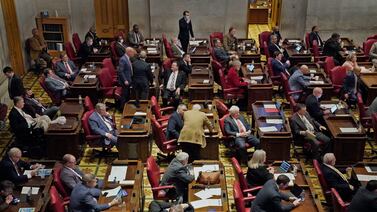Tennessee school leaders grappling with growing needs and shrinking local budgets are now staring at the possibility of $59 million less in state funding than expected next year unless the House pushes back on cuts approved by the Senate.
The elimination of a planned teacher pay raise — without additional emergency funds to backfill local budget cuts and respond to the coronavirus — could force some districts to lay off staff at a time when schools are trying to comply with public health guidelines to reopen safely and effectively in August. Those guidelines include social distancing measures like smaller class sizes and staggered schedules.
The GOP-controlled Senate on Thursday approved a conservative state budget that eliminates planned pay raises for teachers and state employees, while adding hundreds of millions of dollars to the state’s “rainy day” fund as Tennessee braces for several years of economic upheaval.
Approved 27-2, the Senate version sticks closely with Gov. Bill Lee’s revised spending plan and cuts $346 million in all, including significant decreases to higher education.
Senators rejected an effort by Democrats to create a $150 million emergency relief fund for K-12 schools. Arguing for the change, Sen. Raumesh Akbari of Memphis noted that many districts statewide are having to decrease spending, including some employee furloughs.
“We’ve often heard a budget is a moral document. Well this is a moral decision,” Akbari said on the Senate floor. “Are we going to let our school districts drown in the despair of lost revenue, or are we going to do what we can to help lift them up?”
Majority Leader Jack Johnson said the Senate budget is not perfect but positions the state to weather multiple years of revenue shortfalls, including $500 million for the current year and another $1 billion for the fiscal year that begins on July 1.
“I think this budget strikes the right balance” between pessimism and optimism, said the Franklin Republican.
A day earlier, Education Commissioner Penny Schwinn told a congressional committee that reopening schools this August could cost each of Tennessee’s 147 school districts an average of between $1 million to $1.75 million just to pay for cleaning, safety equipment, and related staffing needed — not including the cost of programs for learning recovery.
“Certainly the CARES Act funding that is going to our districts will help support some of that, but it certainly is a significant need,” Schwinn told the committee on education and health chaired by U.S. Sen. Lamar Alexander of Tennessee.
Discussions in Congress could lead to more help for school budgets through a new federal stimulus package, but district leaders can’t wait to make their staffing decisions. They have yet to receive $260 million in federal coronavirus relief expected through the Coronavirus Aid, Relief, and Economic Security Act signed by President Trump in March.
To help pay for immediate needs, all eyes now turn to the Tennessee House as representatives return to Nashville on Monday to tackle the budget. The House and Senate likely will have to negotiate the matter in a conference committee, but hope to reach a consensus and adjourn by Wednesday. For weeks, the two chambers have been at odds over their agendas as they reconvened after passing an emergency budget in March.
“We are hopeful that the House will come back with recommendations to add some one-time dollars that could be used for emergency relief for our public schools,” said Beth Brown, president of the Tennessee Education Association, the state’s largest teacher organization.
While pleased the Senate voted to preserve state funding levels for schools, Brown said eliminating the 2% pay hike will affect more than whether teachers take home more pay. “A lot of districts are counting on that money to keep up their staffing levels,” Brown said Friday.
In Jackson, Madison County commissioners asked their school board to cut about 10% of the district’s budget. Wilson County Schools proposed a budget that eliminates 136 teachers and teaching assistants. A $1.8 million shortfall is predicted for Hamilton County Schools. And in Knox County, the board has made $4.4 million in cuts, including furloughs.
Guidance released by the U.S. Centers for Disease Control and Prevention says schools need to hire additional school personnel, not fewer, to reopen. Those include more custodial staff to keep up with recommended cleaning levels, nurses to monitor the health of students and faculty, and one aide per school bus to screen student temperatures before they board.
Brown said counselors also will be in high demand to help students deal with trauma as the pandemic caused major disruptions to their school and home life.
JC Bowman, who heads the Professional Educators of Tennessee, worries that any staffing reductions, especially for smaller or rural districts, could fall on the arts.
“For a lot of kids, music, band, and the arts are what keeps them in school,” Bowman said. “And at a time when our state is prioritizing educating the whole child, cutting those jobs would be the wrong direction to go in.”
Bowman also is concerned about the message that the Senate’s budget cuts send to long-time educators and college students who are considering the teaching profession.
“What incentive is there to teach right now?” he asked, hoping that the House will push back on the Senate.
“The easy thing to do is come back, agree with the Senate, and go home,” Bowman said. “The hard thing would be to challenge this budget and question some of its priorities.”
You can livestream legislative discussions here.








